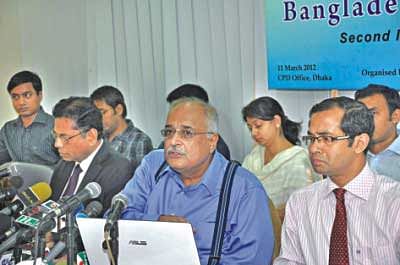Policy mismatch slows investment

Middle, Debapriya Bhattacharya, distinguished fellow of the Centre for Policy Dialogue, speaks at a programme to present the think-tank's review report on the country's macroeconomic performance for 2011-12, at its office in Dhaka yesterday. Left, Mustafizur Rahman, executive director of CPD, was also present.Photo: STAR
The Centre for Policy Dialogue (CPD) yesterday said the government's macroeconomic management, including the monetary policy stance, slowed investment, which is crucial for higher economic growth.
The think-tank also sees a "leadership crisis" in the finance ministry when it comes to resource mobilisation, allocation and utilisation.
The observations were made in its review report on the country's macroeconomic performance for fiscal 2011-12. The report was released at its office in the capital yesterday.
Debapriya Bhattacharya, distinguished fellow of the CPD, briefed the media on the findings, while Executive Director Prof Mustafizur Rahman gave the welcome speech.
The CPD reviewed four core areas -- the state of public finance, developments in monetary sector, capital market movement and balance of payments -- to trace major changes in the macroeconomic scenario since November last year.
“A number of direct and indirect indicators show a slowdown in investment,” said Debapriya.
He said the growth of industrial term loan during July-December of the current fiscal year was just 2.3 percent compared to more than 34 percent in the same period a year ago. Import of capital machinery also went down from nearly 29 percent to only 3 percent in the first half of this fiscal year.
The opening of letters of credit indicates "less than an encouraging prospect" of future investment.
And though foreign direct investment rose by 26 percent during the July-December period, most of the chunk went to the export processing zone, said the report.
“A six plus percent economic growth rate will be achieved by incremental growth of the manufacturing sector along with other sub-sectors, but the 7-8 percent growth rates envisaged in the sixth five-year plan is not possible unless there is an increase in investment scenario,” Debapriya said.
The policy organisation also criticised the Bangladesh Bank for its "double standard" on credit disbursements.
The CPD said the central bank has tightened credit flow to the private sector while giving the government a wider space for borrowing from the banking sector.
“If the government doesn't reduce borrowing from banks, there will be indiscipline in the economic management system,” Debapriya added.
The CPD also criticised the government for its plan to float costly sovereign bond and not utilising the $13 billion foreign aid in the pipeline.
“A dynamic approach involving enhanced development expenditures underpinned by greater disbursement of foreign aid would have been a much proper approach in this regard,” said Debapriya.
On the $1 billion loan form India, he said, “It should be grant, not credit."
On the International Monetary Fund's $1 billion loan, he said the government needs to be cautious more on the conditions.
The CPD report found the overshooting revenue expenditure as a potential risk that would push up public debt to a concerned level from present 39 percent of the GDP. It also said there was no serious attempt of the government to bring structural reforms to address deficit in macroeconomic management and policy implementation.
It said the monetary policy stance for the second half of 2011-12 seems to have assumed controlling of inflation as its core objective, even at the cost of economic growth.
The report said the BB is now prioritising inflation control over growth acceleration and employment creation including actual monetary growth at the expense of private credit growth.
“It appears that the central bank could not fully diagnose the nature of inflation,” Bhattacharya said.
On the capital market, CPD said it is gradually reverting to its pre-boom level.
“Given the persisting structural, institutional and regulatory weaknesses in the market, one needs to be vigilant about any future attempt to manipulate the market,” said the report.
Balance of payments situation has improved due to a fall in import growth and inflow of remittances. The taka managed to regain a part of its lost value and reserve partially recovered signalling an improvement in external balance.
In the finance ministry's leadership, Bhattacharya sees a clear deficiency. He cited the example of the attempts made to manage alternative financing for the Padma Bridge project, which was supposed to be done by the Economic Relations Division of the finance ministry.
Debapriya also said the subsidies meant for the power sector were added much after the budget was announced.
He questioned the withdrawal of transit fees initially imposed by the National Board of Revenue and the finance ministry's role in handling the issue of civil servants' exposure to the capital market.
“Who was leading these moves?” said Bhattacharya.
Replying to a query, he said political stability is a must for steady growth of any economy.

 For all latest news, follow The Daily Star's Google News channel.
For all latest news, follow The Daily Star's Google News channel. 



Comments